Complimentary worldwide shipping on orders over $400 · No import tariffs for most countries
Complimentary worldwide shipping on orders over $400 · No import tariffs for most countries
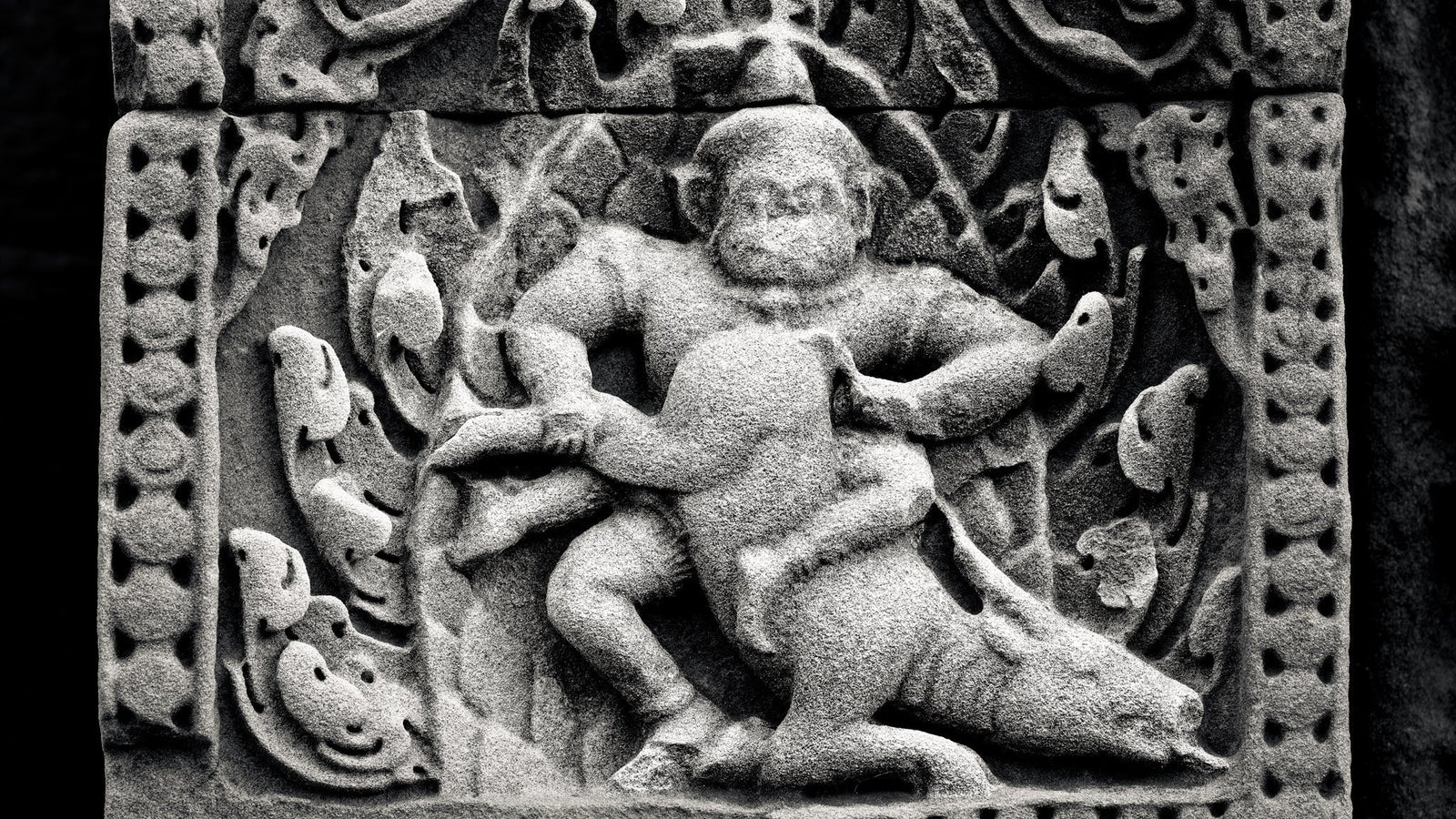
Valin Fighting Dubhi
2 min read
The relief is small, almost hidden, set low on the base of a pilaster where the eye might pass it by unless the body has already slowed. Stone rises around it with ritual seriousness, but here, at ground level, the scene loosens. Valin bends the world downward. Dubhi’s bulk folds. The moment is neither triumphant nor tragic; it is intimate, bodily, strangely comic. Strength has weight, and here it presses close to the earth.
At Banteay Samre, the temple’s geometry holds fast to measure and proportion, yet this image slips the net. Valin does not merely defeat the buffalo demon; he handles him. The gesture is almost domestic, the discipline of force reduced to a private correction rather than a cosmic clash. The gods are not visible. No sky opens. The stone records a quieter truth: power exercised at close range, without witnesses, without ceremony.
Valin is a king, but not here enthroned. He is a body testing another body, learning the reach and consequence of his own strength. Dubhi, the buffalo, carries the density of the land itself—muscle, mud, resistance. As an asura, he does not threaten order through subtlety but through mass. The encounter is therefore not a contest of skill but of containment. One must be held. One must be brought down.
The Reamker tells this story as prelude, a proof of capacity before the later failures of judgement that will undo the monkey king. In the relief, that future is not yet present. What remains is the ambiguity of victory. Valin’s dominance is complete, yet the posture is awkward, almost ungainly. Authority, when stripped of distance, loses its grace. It becomes physical labour.
Humour surfaces here not as decoration but as release. Khmer artisans knew the weight of doctrine, the precision of cosmology, and the discipline of stone. They also knew where to let the structure breathe. A buffalo being spanked by a monkey king is not a joke at the expense of the myth, but a reminder that order is maintained not only through awe, but through familiarity with the stubbornness of matter.
This image sits close to the ground for a reason. It belongs to the level of feet, of walking, of bodies passing by. It does not demand reverence; it waits for recognition. Strength, the relief suggests, is not inherently noble. It must be carried carefully, or it becomes merely force repeating itself.
Later, Valin will be struck down unseen, his power rendered irrelevant by a moral angle he failed to anticipate. That knowledge shadows the carving without touching it. For now, the stone holds a single, suspended lesson: that sovereignty begins as weight in the hands, and that how one applies it is never neutral.
Valin Fighting Dubhi relief, Banteay Samre Temple
Also in Library
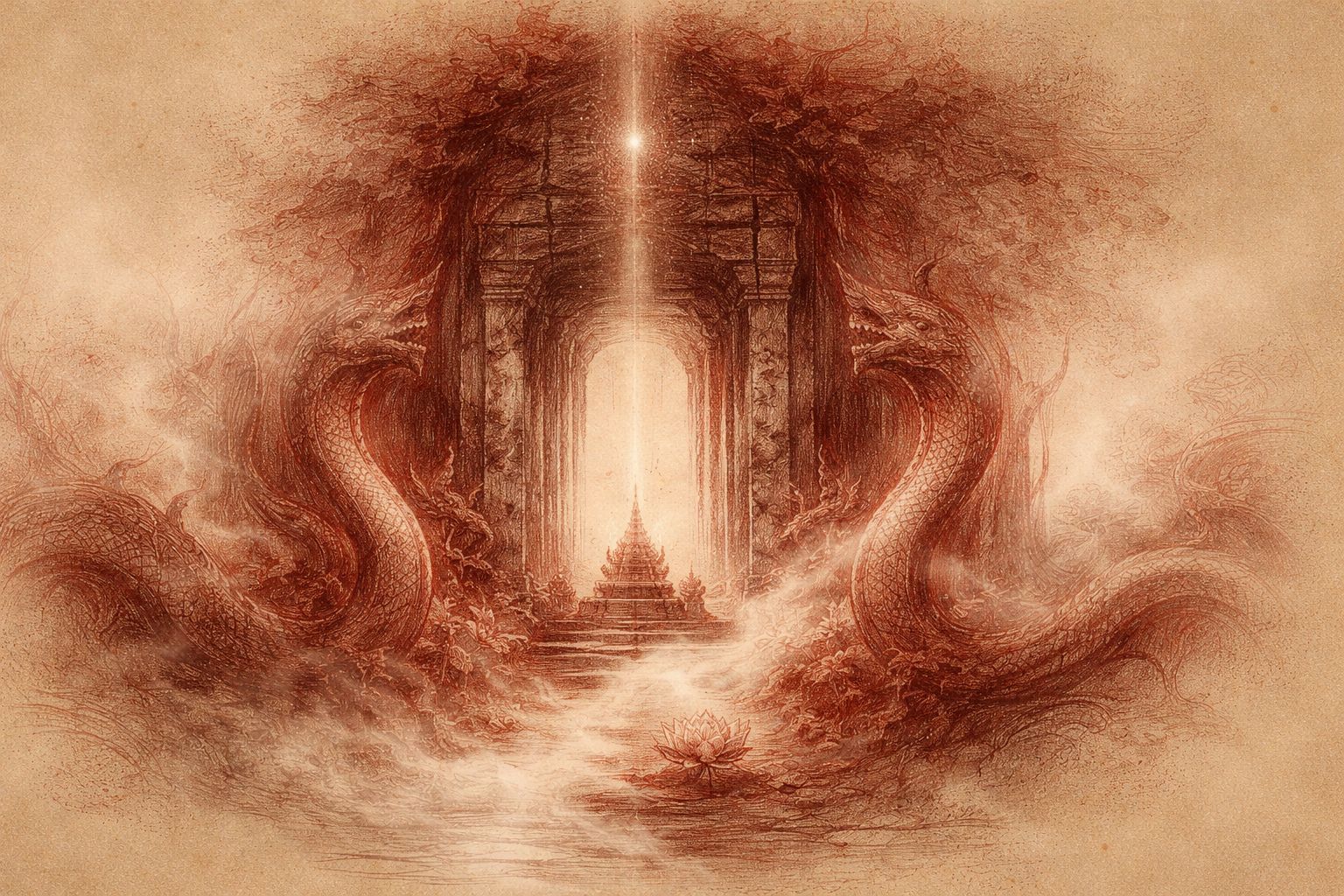
Stone That Remembers the Sky
1 min read
This poem listens to Angkor not as ruin, but as grammar—where moss, shadow, and proportion carry devotion forward without spectacle. What endures here is not glory, but measure: a way of standing that no longer needs witnesses.
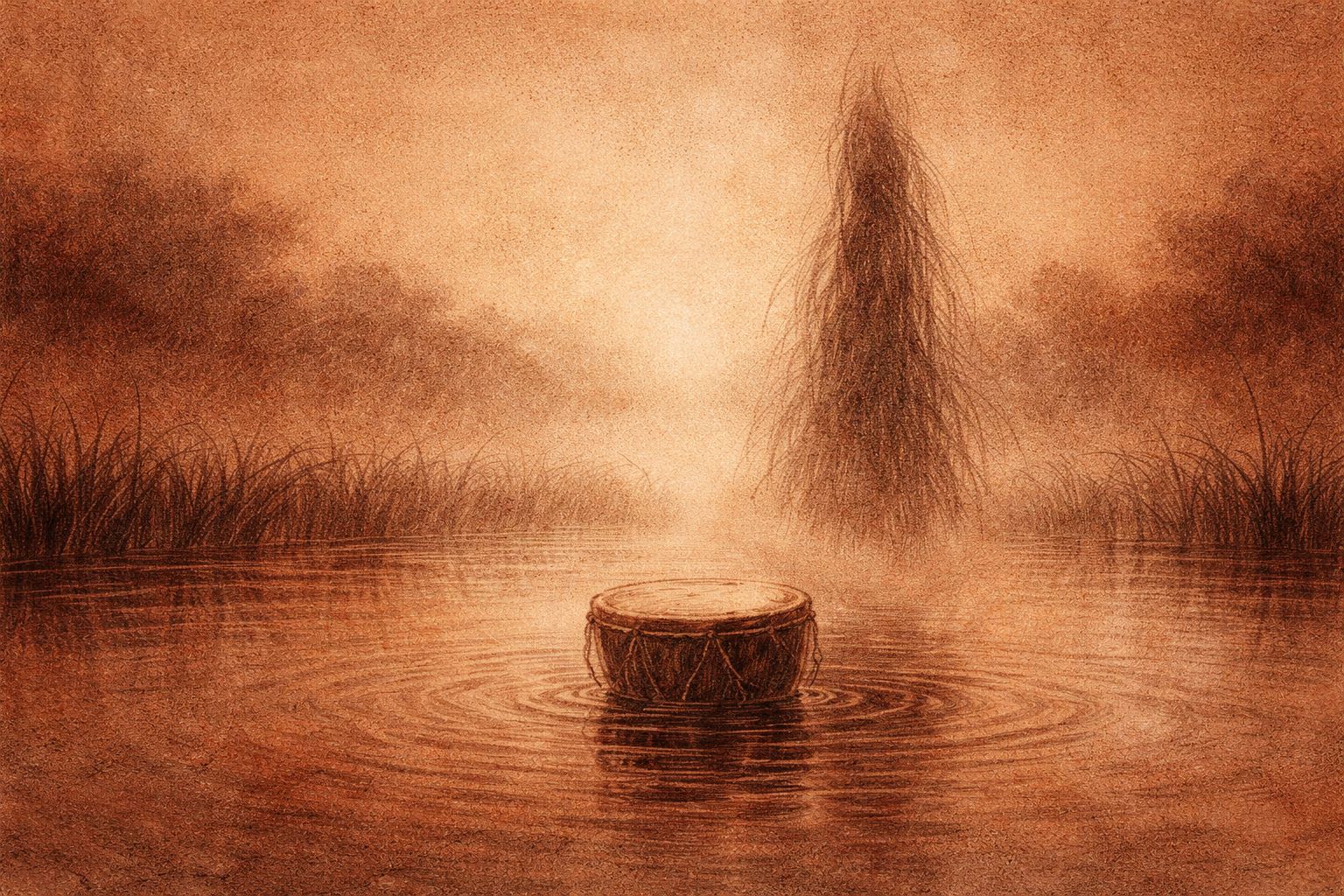
Rice-Ghost and the Seven Drums
3 min read
At harvest, the danger is not hunger but forgetting how to listen.
This folklore retelling speaks of drums struck for silence, of grain taken without gratitude, and of a narrow figure who does not punish—only waits. A tale of pacts made not with spirits, but with attention itself.
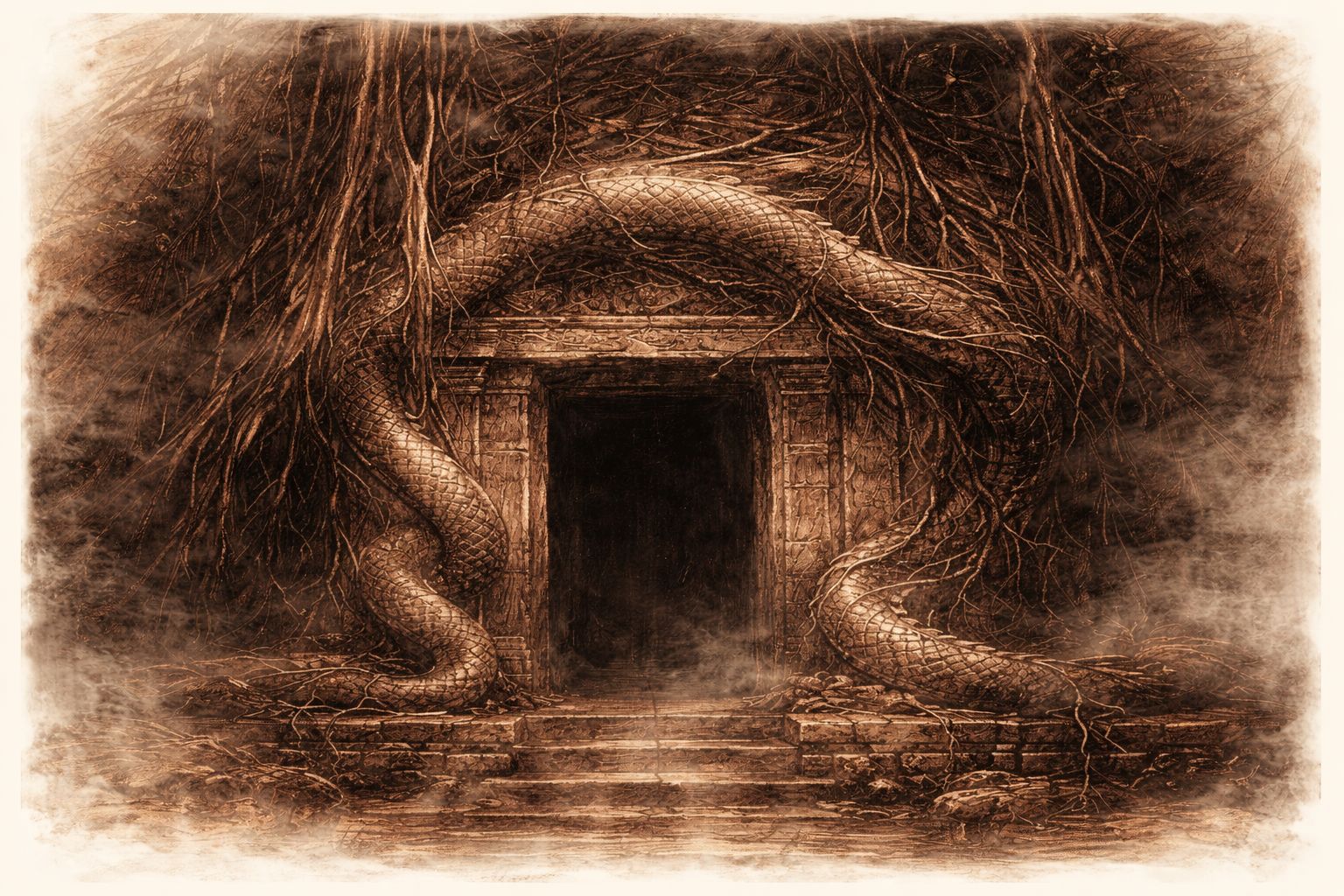
Naga Vow
2 min read
A lost city sleeps in the jungle, its thresholds carved with serpents — not ornament, but law. This vow-poem enters love as sacred hunger: desire as guardianship, devotion as possession, the body speaking without language. A liturgy of heat, roots, rain, and the terrible tenderness of being claimed.
Original artist's print on bamboo paper.
Image 7.25 x 9.1 inches, 18.4 x 23.1 cm
Hand-signed and numbered on border recto.
Edition 5/25
This is an exceptional, individually crafted, museum-quality archival print on fine art paper.
It is accompanied by a unique certificate of authenticity to certify and preserve the provenance of your artwork.
Other print sizes and fine art framing services are available on request.
Art is the creation of forms symbolic of human feeling.
– Suzanne Langer (1895-1985) [Feeling and Form]
Join My Studio Journal
Receive occasional letters from my studio in Siem Reap—offering a glimpse into my creative process, early access to new fine art prints, field notes from the temples of Angkor, exhibition announcements, and reflections on beauty, impermanence, and the spirit of place.
No noise. No clutter. Just quiet inspiration, delivered gently.
Subscribe and stay connected to the unfolding story.
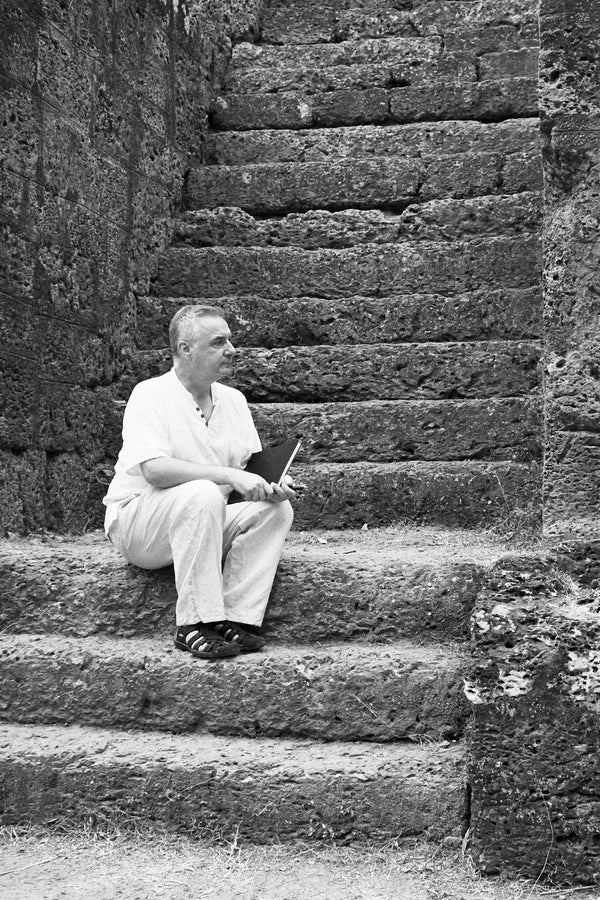
Join My Studio Journal
Receive occasional letters from my studio in Siem Reap—offering a glimpse into my creative process, early access to new fine art prints, field notes from the temples of Angkor, exhibition announcements, and reflections on beauty, impermanence, and the spirit of place.
No noise. No clutter. Just quiet inspiration, delivered gently.
Subscribe and stay connected to the unfolding story.


